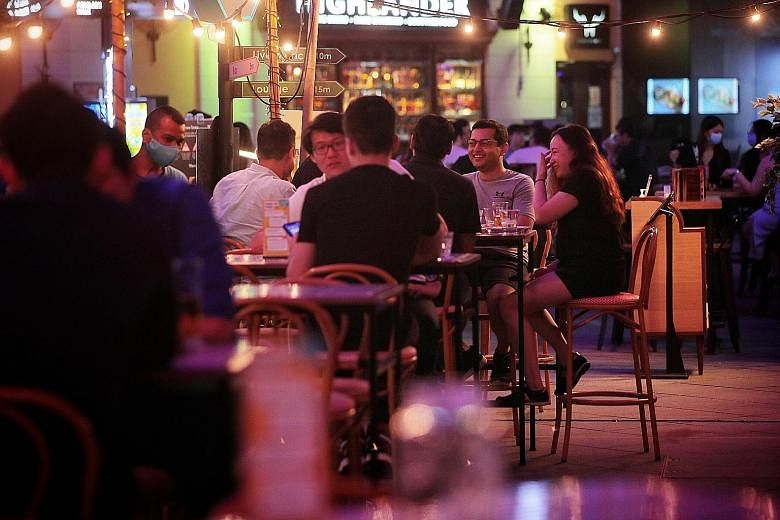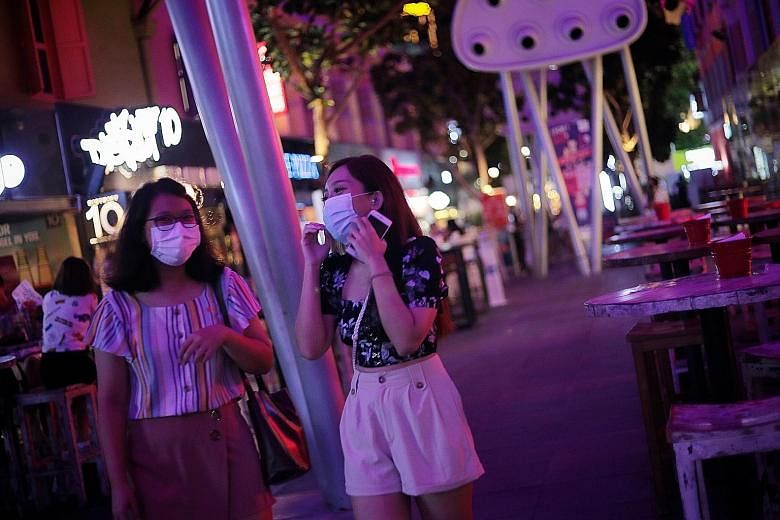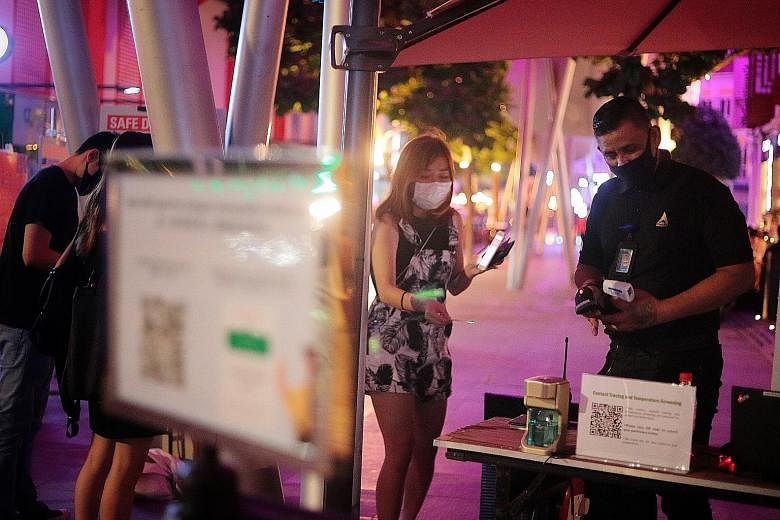The lights have dimmed on Singapore's once-thriving nightlife sector, and with no certainty as to when operating restrictions will be lifted, the industry is mounting a fight for its survival.
The Singapore Nightlife Business Association (SNBA) has appealed to the Government to either allow all nightlife operators to reopen, or to help them navigate their options.
This would entail support for businesses to pivot, hibernate or liquidate, SNBA president Joseph Ong told The Sunday Times.
"Operators can then pick and choose from options that help them to move to the next stage, rather than wait for reopening," he said.
About two-thirds of SNBA's 320 members have been able to resume operations in phase two of the Republic's gradual reopening as they have licences that allow them to operate as food and beverage (F&B) establishments.
But for these firms, viability remains a grave concern.
Restrictions on group sizes and live entertainment and a 10.30pm curb on alcohol sales pose significant challenges, as the sector relies primarily on ambience, social interaction and post-dinner crowds, industry players said.
Meanwhile, landlords are knocking on the doors of the bars, pubs, nightclubs and karaoke lounges that remain shuttered, after mandatory rental waivers ended last month.
The wage subsidies that have prevented more than half of 130 such businesses from retrenching workers - according to an industry poll - will also conclude this month, with a final payout in October.
Nightclubs and KTV establishments form the bulk of those that remain shut due to the higher risk of coronavirus transmission, Mr Ong said.
He estimates that the nightlife industry employs up to 50,000 workers, including bartenders, security guards and performers.
A recent poll by SNBA and the Singapore Entertainment Affiliation, which represents karaoke operators, found that of about 130 respondents that have yet to open, about 40 per cent said they would have to shut permanently if they could not reopen by this month.
Less than 10 per cent said they would survive to end-October if the closures continued.
In the first six months of the year, 59 nightclubs, discotheques, dance clubs and karaoke lounges wound up, according to the Accounting and Corporate Regulatory Authority.
Three proposed pathways
Discussions are ongoing between SNBA and the authorities to work out the next steps as direct cash subsidies run dry.
Mr Ong said the association has put forth three pathways for operators, among other suggestions that balance business concerns and fears of a second wave of infection.
These include government aid to help businesses pivot, such as restructuring grants and consultancy services.
Some businesses may also choose to hibernate until they can resume operations, and can be supported through subsidised rental and temporary redeployment of staff.
For those that opt to throw in the towel, help can be rendered with unwinding tenancy and other contracts, such as through legal services.
This would allow both parties to come to mutually agreeable solutions and prevent costly lawsuits and personal liabilities, Mr Ong said.
To help food and beverage establishments survive, the SNBA has also proposed extending the hours for alcohol sales while limiting seating times to reduce the risk of exposure.
"This would also encourage people to go home afterwards rather than carry on in a private setting," Mr Ong said.
Precinct model
A successful model for how nightlife can resume safely amid the Covid-19 pandemic has yet to emerge as cities battle recurring waves of infection, but Singapore could lead the way, industry players said.
Community cases here have remained low with many bars and entertainment outlets already open, which points to the fact that safe management measures are working, they said.
Some precincts with a heavy presence of nightlife establishments are also taking extra precautions.
At Clarke Quay, for example, temperature screening stations are positioned at four key entrances.
Like the malls that it manages, CapitaLand has implemented SafeEntry requirements to enter, as well as a maximum capacity of one person per 10 sq m.
Clarke Quay's centre manager Adrian Lai said that about 85 per cent of the 60 or so outlets there have reopened, and both marketing and safety efforts have been ramped up.
Restaurant-bar Le Noir, which reopened its Clarke Quay outlet last month, said sales are down 70 per cent.
The 10.30pm restriction on alcohol sales means that patrons often end up having dinner and drinks at the same place, noted founder Mark Brimblecombe.
"Clarke Quay has limited entry points so it's quite self-contained and has good contact tracing. The landlord has been very supportive, but until the hours go beyond 10.30pm it will be hard for the area to pick up," he said.
In Holland Village, where an eatery was suspended in June after crowds in the area became unruly, operators have come together to form a code of conduct to standardise their practices.
The SNBA helped to draft the code for the precinct, popular for the outdoor seating offered by bars and eateries that line the streets.
The code sets out the rules in place and creates an agreement for how operators should react to patrons who violate safe distancing rules, for example.
Mr Ong said: "Prior to this, many didn't feel they had the obligation or right to tell people gathering outside their establishment to stop.
"But as a collective group, everyone agrees infringement is bad not just for their operations but for the precinct."
Aside from the code, operators in the area have also formed a committee and keep in touch through a WhatsApp chat group.
Such models for precinct self-management may help to prevent Singapore from making the mistakes that others have in resuming activities, Mr Ong said.
"I am hopeful and confident that with the way some of these landlords and operators are working with the authorities, we will see more and more sandboxes opening up."
The ministries of Trade and Industry and Home Affairs said in response to queries that nightlife establishments will not be permitted to resume activities for some time.
"We have seen the rapid spread of Covid-19 through nightclubs and public entertainment venues overseas, and we must learn from these occurrences to avoid a similar situation happening in Singapore," they said in a joint reply.
Tokyo and Seoul have seen a resurgence in Covid-19 cases linked to nightclubs and bars.
In Singapore, some nightlife establishments that hold both public entertainment and food shop licences have been allowed to operate, the ministries added.
This is contingent on them ceasing to provide public entertainment, among other requirements.
The ministries said the Government is working closely with the industry to determine possible solutions.
New concepts
Nightlife operators are keeping themselves afloat by creating new revenue streams.
Le Noir's Mr Brimblecombe is launching an online platform called Anynight In that allows consumers to book home experiences by performers and F&B operators.
Japanese izakaya Neon Pigeon, which closed its eatery last month, is among those signing up to offer its house party experience, complete with signature dishes and cocktails.
"Going forward, home entertainment is going to be very important. Covid-19 will change social behaviour as people realise they don't always have to go out to have fun," Mr Brimblecombe said.

Some nightclubs will also be submitting proposals to the authorities to change their concepts, as crowded dance floors are unlikely to return any time soon.
Zouk, which converted its Capital lounge into a restaurant last month, has been catering to a fully booked dining room every weekend, Zouk Group's chief executive Andrew Li said.
This, together with food deliveries from its other outlets, sale of bottled cocktails, live-streaming tie-up with Lazada, pay cuts, wage subsidies and rental waivers, has helped the group to break even this month, he said.
But once support schemes come to an end, it is a question of how long the industry can survive.
"Most places are probably doing 20 per cent to 25 per cent of their original revenues," he said.
Pushing all bars to obtain restaurant licences is not sustainable as the F&B industry is suffering too, and there is no guaranteed return on investment, Mr Li added.
Zouk will be submitting a proposal to the authorities this week for a new concept for its club space, he said, but provided no details.
Mr Ong, who is also managing director of 1-Group, said its portfolio of cafes, restaurants and bars have kept revenue from falling below 50 per cent.
Its 1-Altitude rooftop bar has refocused on dining, and he hopes to transform Yang club at Clarke Quay into a dinner concept featuring acrobatic and other performances.
While the group can afford the $200,000 investment this would cost, not all operators can pivot without help, he said.
Mr Li said that while operators are grateful for the support that has been given thus far, a timeline for reopening is paramount for the industry and its workers.
"Some might want to wait it out, but it's a completely different scenario if it's two months versus six months or a year."














